If Uber and Airbnb say ‘convenience’ spare a thought for ‘inequality’ too


AirBnB landlords move to prevent sub-lets in private rentals. Photo: Getty
Estimated to be worth $2.6 billion in NSW alone, the sharing economy is booming. Those in NSW generating income from the sector doubled to 92,400 people in the year to 2016, according to the latest report by Deloitte. However, academics warn it’s furthering the divide between the ‘haves’ and ‘have nots’ by favouring the better off, eroding employment conditions and increasing a global trend towards irregular, casual work.
In a paper published earlier this year, Boston College sociology professor Juliet Scho found that the sharing economy (also called the ‘gig economy’, ‘peer to peer market’ or collaborative economy’) worsens inequality within the bottom 80 per cent of income groups.
Professor Schor interviewed those earning money from for-profit platforms Airbnb, TaskRabbit and RelayRides (now known as Turo). She found most providers were highly educated with full time jobs or other sources of income. Additionally, they were performing manual blue and pink collar jobs traditionally undertaken by the working class, potentially crowding out those with lower educational qualifications.
Australian research has backed up these findings. This year, researchers at RMIT University released their own in-depth report on the sharing economy in Melbourne.
Head author Jenny Kennedy told The New Daily that one of the biggest problems with the sharing economy is that “it’s mostly built around the idea of excess capacity”.
“That involves already having something. Already having a car you can use to become a Uber driver. Or already having a home – whether it’s owned or rented – that has a space that you can invite somebody in to stay. It’s benefiting the people who already have assets to capitalise on.”
It also benefits those who have access to and competence using digital technologies, she said.
“Most troubling” of all is the way ‘gig’ work erodes conditions. “They don’t have any of the working rights associated with working for an organisation. There is no holiday pay. There is no sick pay. All the security that comes with working for an organisation has disappeared,” Ms Kennedy said.
“It makes people rely on very unstable work conditions and income opportunities. You get sold the ideal of working when you want, how you want, but if you’re supporting your family not knowing how many hours of work you’re going to be able to drum up in the coming weeks, it can be very stressful.
“When you have people vying for the work, then it tends to go to the lower bidder. People can end up working for less than minimum wage.”
As evidence of this, Unions NSW forged a “world-first” agreement in May with online job-posting platform Airtasker to ensure minimum wages for those working through the site.
In the US, Boston College’s Professor Schor found most of those working on a similar platform, TaskRabbit, would have been better off with a full time job. Only 20 per cent of her sample earned more from the platform than they would from a full time job. Nearly half reported earning less.
Indeed, according to Professor Schor, the success of platforms like Airbnb and Uber (founded during the global financial crisis) was aided by high unemployment, personal debt and difficult economic conditions.
She said ‘gig’ platforms contribute to a broader global trend in underemployment, ad-hoc work and declining job security and conditions. On top of that “platform competition, price wars, and pressures to increase transaction volume threaten to drive down wages and erode labor conditions”.
The collaborative economy currently represents a small fraction of the Australian economy. But it’s predicted to expand and transform employment, according to Deloitte.
RMIT University’s Ms Kennedy said the biggest positives are curbed consumption. She said freecycle sites and platforms like OpenShed and Tool Library in Melbourne, and car share schemes like GoGet, are particularly effective in this regard.
“You can’t tar them all with the same brush.
“Where the share economy works best is when resources are being exchanged for something other than money.”








